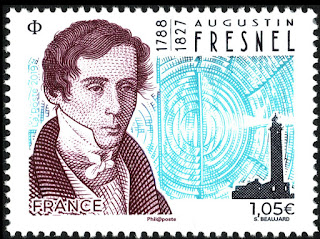The French Revolution was a period of far-reaching social and political upheaval in France and its colonies beginning in 1789. The Revolution overthrew the monarchy, established a republic, catalyzed violent periods of political turmoil, and finally culminated in a dictatorship under Napoleon who brought many of its principles to areas he conquered in Western Europe and beyond. Inspired by liberal and radical ideas, the Revolution profoundly altered the course of modern history, triggering the global decline of absolute monarchies while replacing them with republics and liberal democracies. Through the Revolutionary Wars, it unleashed a wave of global conflicts that extended from the Caribbean to the Middle East. Historians widely regard the Revolution as one of the most important events in human history
Some stamps and a First Day Cover from France and a stamp from Wallis & Futuna depicting the storming of the Bastille
Augustin-Jean Fresnel (10 May 1788 – 14 July 1827) was a French civil engineer and physicist whose research in optics led to the almost unanimous acceptance of the wave theory of light, excluding any remnant of Newton's corpuscular theory, from the late 1830s until the end of the 19th century. He is perhaps better known for inventing the catadioptric (reflective/refractive) Fresnel lens and for pioneering the use of "stepped" lenses to extend the visibility of lighthouses, saving countless lives at sea. The simpler dioptric (purely refractive) stepped lens, first proposed by Count Buffon and independently reinvented by Fresnel, is used in screen magnifiers and in condenser lenses for overhead projectors.
By expressing Huygens's principle of secondary waves and Young's principle of interference in quantitative terms, and supposing that simple colors consist of sinusoidal waves, Fresnel gave the first satisfactory explanation of diffraction by straight edges, including the first satisfactory wave-based explanation of rectilinear propagation. Part of his argument was a proof that the addition of sinusoidal functions of the same frequency but different phases is analogous to the addition of forces with different directions. By further supposing that light waves are purely transverse, Fresnel explained the nature of polarization, the mechanism of chromatic polarization, and the transmission and reflection coefficients at the interface between two transparent isotropic media. Then, by generalizing the direction-speed-polarization relation for calcite, he accounted for the directions and polarizations of the refracted rays in doubly-refractive crystals of the biaxial class (those for which Huygens's secondary wavefronts are not axisymmetric). The period between the first publication of his pure-transverse-wave hypothesis, and the submission of his first correct solution to the biaxial problem, was less than a year.
Later, he coined the terms linear polarization, circular polarization, and elliptical polarization, explained how optical rotation could be understood as a difference in propagation speeds for the two directions of circular polarization, and (by allowing the reflection coefficient to be complex) accounted for the change in polarization due to total internal reflection, as exploited in the Fresnel rhomb. Defenders of the established corpuscular theory could not match his quantitative explanations of so many phenomena on so few assumptions.
Fresnel had a lifelong battle with tuberculosis, to which he succumbed at the age of 39. Although he did not become a public celebrity in his lifetime, he lived just long enough to receive due recognition from his peers, including (on his deathbed) the Rumford Medal of the Royal Society of London, and his name is ubiquitous in the modern terminology of optics and waves. After the wave theory of light was subsumed by Maxwell's electromagnetic theory in the 1860s, some attention was diverted from the magnitude of Fresnel's contribution. In the period between Fresnel's unification of physical optics and Maxwell's wider unification, a contemporary authority, Humphrey Lloyd, described Fresnel's transverse-wave theory as "the noblest fabric which has ever adorned the domain of physical science, Newton's system of the universe alone excepted."
French stamp depicting Augustin Fresnel
1900 – Armies of the Eight-Nation Alliance capture Tientsin during the Boxer Rebellion.
The Eight-Nation Alliance was a multi-national military coalition set up in response to the Boxer Rebellion in China. The eight nations were Japan, Russia, Britain, France, the United States, Germany, Italy and Austria-Hungary.[1] In the summer of 1900, when the international legations in Beijing were besieged by Boxer rebels supported by the Qing government, the coalition dispatched their armed forces, in the name of humanitarian intervention, to defend their respective nations' citizens, as well as a number of Chinese Christians who had taken shelter in the legations. The incident ended with a coalition victory and the signing of the Boxer Protocol.
Stamps of Italy and Germany with overprints issued for use in Tientsin
1912 Born: Woody Guthrie, American singer-songwriter and guitarist (d. 1967)
Woodrow Wilson Guthrie (July 14, 1912 – October 3, 1967) was an American singer-songwriter, one of the most significant figures in American folk music; his music, including songs, such as "This Land Is Your Land", has inspired several generations both politically and musically. He wrote hundreds of political, folk, and children's songs, along with ballads and improvised works. His album of songs about the Dust Bowl period, Dust Bowl Ballads, is included on Mojo magazine's list of 100 Records That Changed The World. Many of his recorded songs are archived in the Library of Congress.
A First Day Cover and a stamp issued by the United States postal service commemorating Woody Guthrie








No comments:
Post a Comment